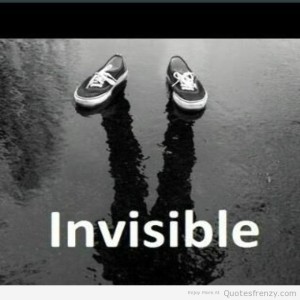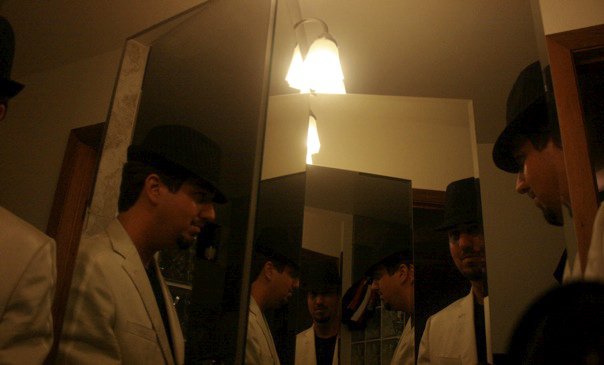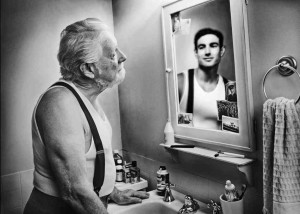Physiognomy
by NorseGamer, HSM Publisher
At a recent production meeting, an interesting question arose: do you envy your avatar?
At first glance, this seems like a ridiculous question; we create our avatars, and can give them any appearance we wish. Indeed, altering an appearance in Home is no more difficult than a few clicks and thumbsticks.
But what we choose as an appearance says volumes about us: it is perhaps what we wish ourselves to be. Or perhaps what we see ourselves as. Or, simply, what we want others to see us as, because we crave a type of emotional reaction.
The moment you alter your avatar’s appearance — hell, the moment you choose, even from a selection of default templates — you are advertising your personality, both in ways overt and subtle. In my own case, I chose to make my avatar look as much like my actual appearance as possible; I believe firmly in digital truth-in-advertising, as it were. And yet there are embellishments, however slight: the face is perfectly bilaterally symmetrical. There is perhaps a superior ogee curve along the cheek. And the last time I had a stomach that flat, I was a teenager.
So it’s close. Those who have met me in real life and seen my avatar in Home have at times commented on the accuracy of the depiction. But what if I wasn’t happy with my physical appearance? Would I have the confidence to faithfully reproduce it in Home?
Honestly, I don’t know. I make no claim to being a particularly handsome sack of flesh, but what if a few blobs of fat were rearranged to present a less attractive appearance? Shave an inch or so off the chin, reduce the hairline, add jowl, subtract height…how would I feel if that was the appearance I stared at in the mirror every day? Would I be so hell-bent on faithfully representing it in Home?
As a species, like it or not, we judge each other by physical appearances. Ever looked at a woman’s physiognomy and silently concluded to yourself that she was a complete and utter bitch, without ever saying hello to her? Ever discounted the input of a male colleague simply because his jawline wasn’t alpha enough?
 I can’t imagine, psychologically, what it must be like to spend a lifetime so relegated and denigrated. Nor do I particularly want to. I’ve been through my own share of such treatment; your culture teaches you the fashions, styles, mannerisms, gesticulations and vocal tricks needed to appear more dominant and attractive, but it is nonetheless a tiresome multitude of skins to wear each day, depending on circumstances. And I have no illusions that I’ve had an easier time of it than many, so it would be callous to not be sympathetic.
I can’t imagine, psychologically, what it must be like to spend a lifetime so relegated and denigrated. Nor do I particularly want to. I’ve been through my own share of such treatment; your culture teaches you the fashions, styles, mannerisms, gesticulations and vocal tricks needed to appear more dominant and attractive, but it is nonetheless a tiresome multitude of skins to wear each day, depending on circumstances. And I have no illusions that I’ve had an easier time of it than many, so it would be callous to not be sympathetic.
At the same time, there is an undeniable dark side to the freedom of a virtual world: when you can portray yourself as anything you want — and that’s coupled with anonymity and relative freedom from physical harm or retribution — it can sometimes (not always, but sometimes) be the people with the most uncomfortability, and thus the most they feel they have to hide, who cause the greatest harm to the collective good.
To borrow for a moment from Stephen M. R. Covey, society moves at the speed of trust. And in any online environment — especially a 3D virtual world — you learn quickly that protecting your emotional well-being is the single most important thing you can do. Isn’t it odd how much importance we place on physical appearance? No matter how prominent someone may become within this particular social scene we call Home: when there’s an overt lack of any physical appearance reference from a particular user — especially if it’s a prominent user — there’s always that question of, “Yeah, but what are you hiding?”
Interesting, isn’t it: the fear of rejection is what causes someone to hide behind an artificial construct, and perhaps even serves as a powerful psychological lure to spending time in Home itself. And yet I must confess a personal bias: that those few who dare to actually show their real appearance are the ones who tend to impress me more with their honesty, or at the very least their courage. It doesn’t necessarily make the person a better person inwardly, but it does mean that they have an inner take-me-as-I-am confidence, which I respect.
The immediate counter-argument to this, of course, is that we shouldn’t have to rely on physical appearances to form judgments about a person’s character; that the beauty of Home is that we can be ourselves to each other, without all of that getting in the way.
Except we’re not simply ourselves to each other, are we. More often than anyone is comfortable admitting, we craft our digital selves to be something more appealing, more attractive, more intriguing than we are in real life. And without any real-world comparison point as an anchor, the uncomfortable truth is that it’s very hard for people to know how to relate to each other when everything is fluid and nothing is risked. Because while you are not your arm, nor your leg, nor the ring of fat around your abdomen or the bulbous sag of your double chin, they are a part of you, and reveal the truth of how others will accept or reject you.
 Perhaps it would be better if we as a species weren’t wired to judge each other so. Wouldn’t it be wonderful if we could all see ourselves in some glorious sci-fi concept as the multi-dimensional imaginative souls we are, accepting that all of these different faces we wear are simply parts of the same core being? But that would require a consciousness shift within us as an entire race, and that ain’t happenin’ anytime soon. Granted, makes you wonder how the hell we’re all going to get along when we get to heaven, if you believe in such a thing.
Perhaps it would be better if we as a species weren’t wired to judge each other so. Wouldn’t it be wonderful if we could all see ourselves in some glorious sci-fi concept as the multi-dimensional imaginative souls we are, accepting that all of these different faces we wear are simply parts of the same core being? But that would require a consciousness shift within us as an entire race, and that ain’t happenin’ anytime soon. Granted, makes you wonder how the hell we’re all going to get along when we get to heaven, if you believe in such a thing.
This, then, is the paradox of all social MMO experiences: they give us the freedom to be whatever we want, and that same freedom dooms us within that world to never be truly accepted for whom we are.
Share
| Tweet |




 LinkedIn
LinkedIn Twitter
Twitter
I go by demeanor, attitude, and kindnesses. If they have those three traits no need to see what they look like in real life.
Though, I see your point in the honesty in representing one’s physical self, I have to contest that displaying ones appearance accurately is not important in means of displaying your personality. When you look at Playstation Home the application, it is built as an aid in improving communication. It does this in a few ways. One, it encourages expressing yourself through text on the spot during in-game conversations. Given this, you are then absent of tone of voice and body language so off the bat it helps one improve how they convey information and emotion. I’m sure you’re aware of the many inter-drama caused by just that, misunderstandings. Also, an avatar can help one amplify characteristics which they value within themselves. A stern jaw, tall, muscularity, etc. display strength and fortitude, confidence and leadership. Being a Homeling General, I know my avatar helps in relaying these qualities I value in myself that otherwise may not be taken notice do to social stereotypes and prejudices. Also, Home is the perfect breeding ground for creativity do to the variety of customizations. In the Homelings, most of our members can be recognized by the distinct facial features. Each distinct and each recognizable. This is virtually equal to creating a ‘You’ in a virtual realm. Now, your words, mannerisms, etc. are now associated with that face. Mannerisms, you say? Indeed. If one plays Home long enough, you will start to pick up on the habits Home users have using their avatars. Things like emotes they regularly use, dances they prefer, etc. One of our members actually communicated only using emotes for years yet managed making friends and keep company. Point is, though the virtual world doesn’t allow an exact replica of our actual selves, the avatar is no less you, it is rather, another expression utilizing the application in its most creative way. One can tell a lot about someone from their creativity. I truly value this experiment which is Playstation Home, there is much to it that goes unrecognized. One of those things is the alternate uses it has within it.
;^) Heh. Was this article inspired by finally meeting me at E3 this year? Hmmmm….
:^/ Personally, I am partly guided by how much attention someone has paid to creating his avatar. Whether it’s particularly attractive or not, the time devoted to tweaking its appearance away from the default settings reveals how important the avatar’s looks are to that user.
My other guide is behavior. A 3D polygon skin cannot tell me what someone really looks like on the outside, but behavior reveals what one looks like on the inside, which of course is more important.
Are we right to judge others by their appearances? Dr. Martin Luther King taught that we should not, but Mark Twain once observed: “Clothes make the man. Naked people have little to no influence on society.” Perhaps the wisdom lies in which details we take our cues from. Things beyond the other fellow’s control should not form the basis of our assesment of him. Things that reflect the choices he has made are perhaps more sutiable. Offline, that would be his attire, but in Home it would include every detail.
So, a heavyset avatar in Home could be a realistic approximation of someone who is comfortable with his larger size, or an experiment by someone who is much more slender offline. But either way, it’s a choice that user made, and thus reflects his personality and creativity.
;^) Heh. The more we discuss Home, the more we discover to say about it. No wonder HSM has done so well all of these years….
Actually, this article initially stemmed more from my fascination with how a few aspiring-to-be-prominent members of the community have managed to acquire followings over the years, despite either never showing their true appearance or outright lying about it. Going into specifics on this front would likely be considered blacklisting, however, and while HSM doesn’t have to play by SCEA/SCEE’s forum rules, I see no reason to point out open secrets which are already largely known.
What motivates someone to craft a wholly false identity? Is it deep insecurity, deep longing, or something else? And then, what happens when you become trapped by that identity, and can’t step out from its shadow?
In truth, I feel sorry for such people. Home, and places like it, fill a *need* rather than a whim. Hence why, with this article, I’m trying to see both viewpoints, and the larger picture it creates.
You do have a point, though: there’s never a shortage of meaty subjects to write about in Home, if one chooses to delve into them. It forms the evergreen backbone of HSM as Home’s literary journal.
Was great meeting you at E3 this year, too!